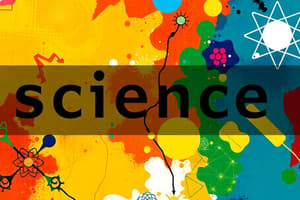Podcast
Questions and Answers
What is the primary focus of physics within the natural sciences?
What is the primary focus of physics within the natural sciences?
- Study of matter, energy, and forces (correct)
- Study of chemical reactions
- Study of Earth's processes
- Study of living organisms
Which branch of science primarily deals with the study of social behavior and institutions?
Which branch of science primarily deals with the study of social behavior and institutions?
- Social Sciences (correct)
- Formal Sciences
- Applied Sciences
- Natural Sciences
What is the first step in the scientific method?
What is the first step in the scientific method?
- Experimentation
- Conclusion
- Observation (correct)
- Hypothesis
Which of the following best describes a scientific theory?
Which of the following best describes a scientific theory?
What does applied science focus on?
What does applied science focus on?
Which of the following is NOT part of the scientific method?
Which of the following is NOT part of the scientific method?
What characterizes a scientific law?
What characterizes a scientific law?
Which of the following statements about science is true?
Which of the following statements about science is true?
Study Notes
Definition of Science
- Systematic enterprise that builds and organizes knowledge in the form of testable explanations and predictions about the universe.
Main Branches of Science
-
Natural Sciences
- Physics: Study of matter, energy, and the fundamental forces of nature.
- Chemistry: Study of substances, their properties, and reactions.
- Biology: Study of living organisms, their structure, function, growth, and evolution.
- Earth Science: Study of the Earth and its processes, including geology, meteorology, and oceanography.
-
Formal Sciences
- Mathematics: Study of numbers, quantities, shapes, and patterns.
- Logic: Study of reasoning, argumentation, and the principles of valid inference.
-
Social Sciences
- Psychology: Study of the mind and behavior.
- Sociology: Study of social behavior, society, and social institutions.
- Economics: Study of the production, distribution, and consumption of goods and services.
-
Applied Sciences
- Use of scientific knowledge to develop practical applications (e.g., engineering, medicine).
Scientific Method
- A systematic approach used for investigation that involves:
- Observation: Gathering data through senses or instruments.
- Question: Formulating a question based on observations.
- Hypothesis: Proposing a testable explanation.
- Experimentation: Conducting experiments to test the hypothesis.
- Analysis: Interpreting the data collected from experiments.
- Conclusion: Drawing conclusions based on the analysis to accept, revise, or reject the hypothesis.
Key Concepts in Science
- Theory: A well-substantiated explanation of an aspect of the natural world, supported by a body of evidence.
- Law: A statement that describes an observable occurrence or a relationship within nature, often expressed mathematically.
- Fact: A statement that can be proven true based on evidence.
Importance of Science
- Promotes understanding of the natural world.
- Drives technological innovation and improvements in quality of life.
- Informs policies and decision-making based on empirical evidence.
- Encourages critical thinking and skepticism, fostering inquiry and exploration.
Definition of Science
- Science is a systematic way of gaining and organizing knowledge about the universe through testable explanations and predictions.
Main Branches of Science
- Natural Sciences study the physical world:
- Physics explores matter, energy, and fundamental forces of nature.
- Chemistry focuses on substances, their properties, and how they interact.
- Biology investigates living organisms, their structure, function, growth, and evolution.
- Earth Science examines the Earth and its processes, including geology, meteorology, and oceanography.
- Formal Sciences deal with abstract systems of thought:
- Mathematics studies numbers, quantities, shapes, and patterns.
- Logic explores reasoning, argumentation, and the principles of valid inference.
- Social Sciences examine human society and behavior:
- Psychology studies the mind and behavior.
- Sociology investigates social behavior, society, and social institutions.
- Economics focuses on the production, distribution, and consumption of goods and services.
- Applied Sciences use scientific knowledge for practical applications:
- Examples include engineering, medicine, and other fields that translate scientific knowledge into real-world solutions.
The Scientific Method
- This method is a systematic approach to investigation:
- Observation: Gathering information through senses or instruments.
- Question: Formulating a question based on observations.
- Hypothesis: Proposing a testable explanation.
- Experimentation: Conducting experiments to test the hypothesis.
- Analysis: Interpreting data collected from experiments.
- Conclusion: Drawing conclusions based on analysis to accept, revise, or reject the hypothesis.
Key Concepts in Science
- Theory: A well-supported explanation of a natural phenomenon, supported by evidence.
- Law: A statement describing an observable occurrence or relationship in nature, often expressed mathematically.
- Fact: A statement proven true based on evidence.
Importance of Science
- Enhances our understanding of the natural world.
- Drives technological innovation and improves quality of life.
- Provides evidence-based information for policy decisions.
- Promotes critical thinking, skepticism, and a spirit of inquiry.
Studying That Suits You
Use AI to generate personalized quizzes and flashcards to suit your learning preferences.
Description
This quiz explores the definition of science and its major branches, including natural, formal, and social sciences. Test your understanding of various fields such as physics, chemistry, biology, and more. Challenge yourself to see how well you grasp the systematic approach of building and organizing knowledge in science.



